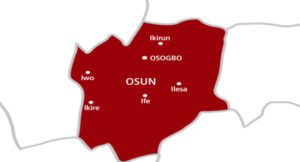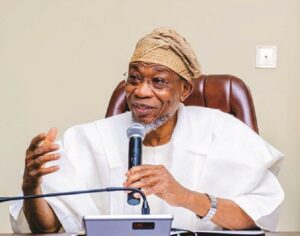


Between Osun PDP’s aspersion and Oyetola’s compassion
By Jimoh Olorede
After election into power, politicians in Nigeria should demonstrate commitment and concentrate on governance with intent to deliver on their electioneering campaign promises to the electorate. It’s however unfortunate that many Nigerian politicians believe everything is politics, thus play ‘politics’ with everything.
It’s regrettable that Nigerian youths, whose number takes the largest chunk of the nation’s voting population, lack the courage and wherewithal to interrogate elected politicians on the implementation of their manifestos for which they were voted into power. The problem with the youths is simply that some have actually killed the goose that lays the golden eggs by sacrificing their future gains just to satisfy their present needs.
Nigerian politicians also mischievously deprive the youths of the wherewithal to challenge them in order to perpetuate their hegemony over them and their continuation in power. Osun State, just like other parts of the country, seems to exemplify this scenario. If not, the youths and other discernible minds in the state should have engaged the Peoples Democratic Party (PDP) led-government on how it spent the hefty sum of N141.48bn it received from the Federation Account Allocation Committee (FAAC) in the year 2023, which was an average of N11.79 bn per month, according to data from the office of the Accountant General of the Federation (AGF) and the National Bureau of Statistics (NBS).
Instead of concentrating on democratic dividends delivery, and ameliorating economic hardship in the state, the PDP led-government has since assumption of power, shifted from electioneering campaigns to calumny campaigns exerting all its efforts and determination to cast aspersion on the immediate-past governor of the state, Adegboyega Oyetola, who is now a Minister of the Federal Republic.
In what appeared silly and petty, Osun PDP, in the last couple of days, has rented the media space and electromagnetic broadcast waves in the state and even beyond, with disparaging and damaging unfounded narrative about Oyetola in an attempt to discredit his personality in the psych of unsuspecting members of the public.
Alleging Oyetola of arrogating the authority of Mr. President in Osun State and offering him as a sacrifice for the inability and failure of governor Ademola Adeleke to alleviate poverty and ameliorate people’s suffering in the state is dramatically absurd!
Also, alleging the Minister for Marine and Blue Economy of hijacking Small and Medium Enterprises Development Agency of Nigeria’s (SMEDAN) programme in the state is an ignorance-exposing and effrontery-showcasing affront that revealed the party’s chairman’s shameless boldness. For PDP and governor Ademola Adeleke’s information and education, SMEDAN is an agency of the Federal Government, and Oyetola must have been invited by the Director General of the agency, Charles Odii, to his agency’s recent programme in the state for reasons of inter-agencies’ collaboration and policy synergy.
Bemoaning the former governor Oyetola for taking rice, even if it’s true, from the National Emergency Management Agency (NEMA) and distributing same to the needy residents of Osun State to cushion post-subsidy removal effect and people’s economic hardship, is the height of Adeleke led-government’s insincerity. The governor must be trying to outwit us and gaming with our collective intelligence in the state by casting aspersion on Oyetola’s compassion and advancing his genuine intervention as an alibi for his failure to equitably distribute federal government palliatives released to the state.
It’s amazing that the selfless and compassion-driven Oyetola inherited a throat-taking humongous debt to the tune of over N154bn on his assumption as governor of Osun State in 2018, and with his fiscal discipline, expertise and prudence, he repaid over N99bn within four years while concurrently maintaining recurrent expenditure and statutory obligations of his government, and left over N14bn in the coffers of Osun when exiting in 2022 for governor Ademola Adeleke’s fortunate inheritance.
Apart from the N141.48bn received last year, 2023, also last month, governor Adeleke received a huge sum of N8.6bn from FAAC, according to NBS on the distribution of revenue allocation to state governments for the month of January, 2024 shared in February, 2024. Also, according to figures obtained from the 2024 approved budget, Osun State, among others, is projected to get N99.09bn in 2024, under the current revenue-sharing formula, as statutory federal allocations to the coffers of the state governments will increase by 69 per cent to N5.54tn in 2024, as reported by the press.
It’s no gainsaying, as its veracity is easily obtainable in statistics, that governor Ademola Adeleke had received just in six months what it took the whole of Oyetola’s four-year tenure to receive from the federal government (FAAC). So, the governor should rather be busy with business of governance and stewardship to justify the largesse received from the federal government and the generosity of Asiwaju Bola Tinubu instead of drawing the name of the President in the mud. He should tell the citizens of the state how he has been administering the affairs of government regarding his management of the huge resource allocations from the federal government, and jettison his plans, as discovered, on international borrowing to the tune of N12.36bn for the State’s 2024 budget.
The governor and his party as an entity are herewith advised in the interest of Osun State to shun bitterness and vendetta evident in their malicious campaigns of calumny against Oyetola. As state’s helmsman, Adeleke should concentrate on contacts building and lobbying of relevant agencies of government at national level, Oyetola’s Marine Ministry’s juicy and high-profile agencies inclusive, for development facilitation in the state.
Dr. Olorede, MNIPR, PhD, writes from Oderinde’s Compound, Iragbiji, Osun State.



